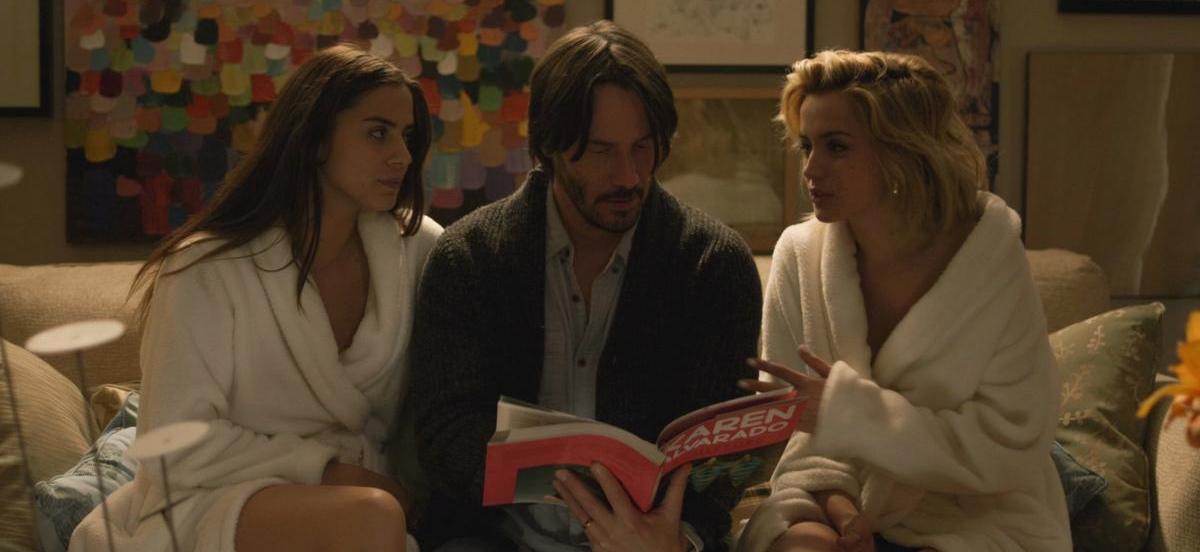A couple of sexy, scantily clad and soaking wet young women knock on the door of a happily married, middle-aged husband and father of two—who happens to be home alone on a long, holiday weekend—in Eli Roth’s “Knock Knock.”
The words “Eli Roth” in front of the title should tell you that it won’t just be about illicit, titillating fun, followed by an obligatory bit of remorse. But this time, the longtime horror director doesn’t go for the gore the way he gleefully did in his early films (“Cabin Fever,” “Hostel”). Instead, he aims to disturb us on a deeper level: He wants to hit us where we live. Literally.
Roth’s film, which he directed and co-wrote, is an update of a trashy little exploitation flick called “Death Game” from 1977. (The two actresses who were its stars, Sondra Locke and Colleen Camp, get producing credit here while Camp appears in a brief supporting role as a nosy friend). His intention, he says in the film’s press notes, was to demonstrate how much more quickly we experience everything in the social media age—both the delights and the torments—and how the rules of civilized society no longer seem to apply.
But he makes his point far clearer in the notes than he does in the movie itself. Roth skillfully builds tension until the moment when everything snaps and goes insane, followed by a series of shrill and repetitive scenes of increasing torture and destruction, all of which leads to The Big Reveal of what inspired these vicious games. As a piece of social satire, “Knock Knock” winds up being not just toothless but anticlimactic.
But it does feature Keanu Reeves, who’s game for all the craziness that comes his way in the leading role. He stars as Evan, an architect living in a coolly sprawling minimalist home filled with colorful, modern art in the hills outside Los Angeles. Roth sets the mood rather elegantly off the top, with long, gliding camerawork over the Hollywood sign, through Malibu canyons and down serene, suburban streets until he winds up at Evan’s front door. Clearly, this is an idyllic place—which the presence of Evan’s flirty, artist wife (Ignacia Allamand) and adorable son and daughter confirms. Nothing could possibly go wrong here.
There almost seems to be an intentional awkwardness to these early interactions between Evan and his family; they’re too happy and perfect, like folks you’d see forced together in a catalog. At first, it’s as if Roth and co-writers Nicolas Lopez and Guillermo Amadeo are toying with the notion of domestic bliss, only to hold it up to the light, examine it and crush it to pieces later on. The execution never feels quite so focused, however.
With the wife and kids away on a beach trip, Evan uses the weekend to catch up on a project, enjoy some red wine, maybe smoke a little pot and listen to his treasured vinyl on the turntable. But then, there’s a knock at the door on the one night there happens to be a torrential downpour in drought-stricken Southern California. Standing on his front porch, giggling and dripping in itty-bitty clothing, are the brunette Genesis (Lorenza Izzo, Roth’s real-life wife) and blonde Bel (Ana de Armas), who must be half his age.
The two friends insist innocently that the cab dropped them off in the wrong spot on the way to a party, and now they’re lost, so could they please come in and use the phone? And maybe take off their clothes and throw them in the dryer? As Julianne Moore says so drolly in “The Big Lebowski” while showing Jeff Bridges the porno movie “Logjammin’”: “Lord, you can imagine where it goes from here.”
And it does go there—sort of—in time. The playful pals snuggle up in fluffy, white robes while waiting for their clothes to dry and the car service to arrive (which takes an estimated 45 minutes, conveniently). As they get friskier and more suggestive with Evan, he genuinely tries his best to be a gentleman and remain loyal—scooching over to a different chair, or going out of his way to compliment his wife’s sculptures. The first half of the film is far superior to the second, as Roth takes his time and keeps us guessing as to who these girls really are and what might happen. Reeves’ easygoing, low-key screen persona serves him well here and provides an intriguing contrast to Izzo and de Armas’ hypersexuality.
But then! And this really isn’t a spoiler, because something’s gotta give—something does give. Roth shoots the ménage a trois with surprising taste and restraint—and that’s the last moment of taste and restraint you’ll get from him. The next morning, “Knock Knock” shifts abruptly and becomes an insanely over-the-top version of Michael Haneke’s “Funny Games.” (Pick the version of your choice. There are two). Genesis and Bel reveal their true selves—we think—as noisy, destructive, overgrown children. And the trouble is, the change happens out of nowhere; they become crazy people too quickly, and the change in tone is jarring.
More problematic: Because their characters become so unbelievable in the extent to which they make Evan’s life a living hell, it’s impossible to become truly frightened by their actions or threats. They’re more screechy and annoying than anything else, like bratty tweens jacked up on sugar and caffeine. Reeves, meanwhile, eventually amps up (and camps it up) as well, delivering a long and profane tirade while tied to a chair with an electrical cord.
“I was a good guy! I’m a good father!,” he screams and spits in vain, reminiscent of Nicolas Cage’s awesomely outlandish work at the end of Neil LaBute’s “Wicker Man” remake. That one moment suggests the cult B-movie that “Knock Knock” could have been. Instead, the ending—with its revelation of what these girls were really after all along—is so frustrating, you’re likely to wonder: Is that all there is?




















